Sacred & Profane Mystery Solved
 Thursday, July 26, 2007 at 09:44PM
Thursday, July 26, 2007 at 09:44PM About a week ago I posted a photo of some creature who crawled up on my statue of Mary and died. It was hideous and looked rather demonic. To refresh your memory, here it is again.

I asked a friend who knows all things related to plants and animals and learned that this is a cicada, member of the insect choir of Summer. From treetops they contribute heartily to the ambiance of Summer, making that unmistakeable churling noise that rises and falls like auditory waves in the air.
Primarily tropical creatures, the cicada thrives in the American South, which tells you how tropical it is here. The cicada begins as an egg burrowed in the bark of a tree that eventually emerges as a nymph. The small cicada then goes underground to live most of its life (nine months to 17 years), sucking the sap of tree roots for nourishment and occasionally shedding its skin. Upon reaching adulthood the nymph digs up to surface earth, climbs onto a tree trunk (or a statue of Mother Mary), sheds its skin one last time, leaving behind this horror I found attached to Mary's head. Over the course of a few days to a few months, the cicada then mates, lays eggs, sings a little and dies. All in all, not a bad arrangement.
The cicada has a fascinating symbolic history having attracted the imagination of humans since the first person saw a cicada emerge from the earth to sing and die. To the ancient Greeks the cicada symbolised resurrection, rebirth and immortality because it came back to life from the ground. The Greeks thought that this insect lived off of dew or dew and air because the cicada discretely eats without revealing its food source. In Taoism the cicada is the symbol of the hsien, or soul, disengaging from the body at death, but in the Christian faith the cicada has been seen as a symbol of the newly baptized and even Christ himself. In ancient China the cicada was a symbol of immortality and purity (due to its imagined diet of dew). Chinese jade amulets were placed in the mouth of the dead to assure immortality. Even the Zuni Indians had a legend surrounding the cicada teaching the coyote to sing, and an ancient Indian belief states that rain will occur about a week after locusts begin to sing at night (sometimes cicadas are referred to as locusts).
So Mary's visiting cicada was no monster after all, rather an insect that has been the subject of poetry, art, sermon and legend. I suppose it is fitting that this little guy chose the Holy Mother's head on which to shed its skin and emerge to fly off, sing and die.
 Nature
Nature 





